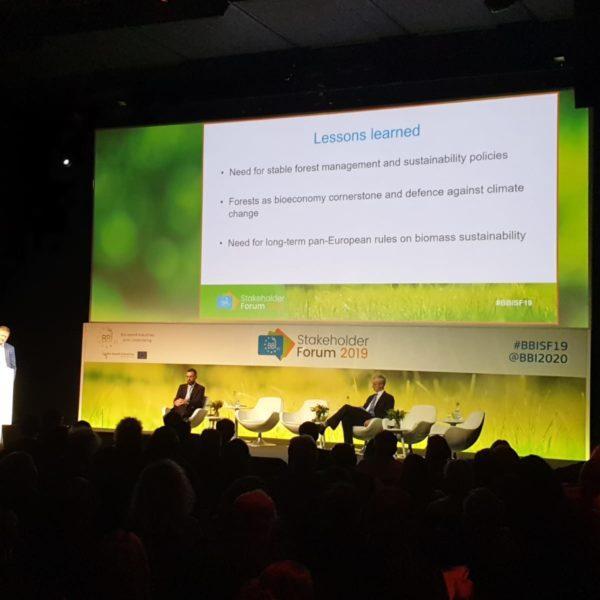Fibenol & SWEETWOODS flagship Inaguration Event
Last week we took a moment to reflect on the journey of the SWEETWOODS projects and how far we have come. Thank you to all the partners and friends for joining us on this day. Your support shows that the bioeconomy is moving in the right direction. While much work is still ahead, we have already achieved some important milestones.
“I am very proud of the SWEETWOODS achievements under the leadership of Fibenol. The biorefinery is spurring the creation of a new bio-based industry and innovation hub in Imavere focused on forestry-based chemicals and materials. It is creating jobs and boosting the regional economy. This is a clear example of circular bioeconomy in action.” – Circular Bio-based Europe Joint Undertaking (CBE JU) Executive Director Nicoló Giacomuzzi-Moore.
“The SWEETWOODS project has been an excellent showcase of solutions-oriented public-private hashtag#partnership, which has built a strong foundation for innovation throughout value chains. Fibenol flagship biorefinery has established itself as a cornerstone of the bio-based economy for the future. As proof, several projects already use our products as feedstock for their novel bioprocesses, materials, and chemical production to reduce their SCOPE 3 CO2 emissions. Thanks again to everyone who has contributed to our journey so far—it has been a joyful ride,” – Peep Pitk, CDO of Fibenol.
The journey is not only about Fibenol and Sweetwoods but also about the united efforts we make in the industry to move beyond using fossil-based material.
Fibenol Demo Plant Success: Meet the Team Behind It!
Fibenol is spearheading the SWEETWOODS demo plant project and has completed preparations for its commissioning. Behind this success is a remarkable team, whose story is captured in this video. The demo plant is a groundbreaking achievement that has been made possible thanks to Fibenol’s innovative approach and collaborative team effort. From the engineering and design to the installation and commissioning, the Fibenol team has worked diligently to bring the project to fruition. Through the video, viewers can gain insight into the journey that Fibenol has taken and the remarkable people behind it.
Water treatment and the future for fiber
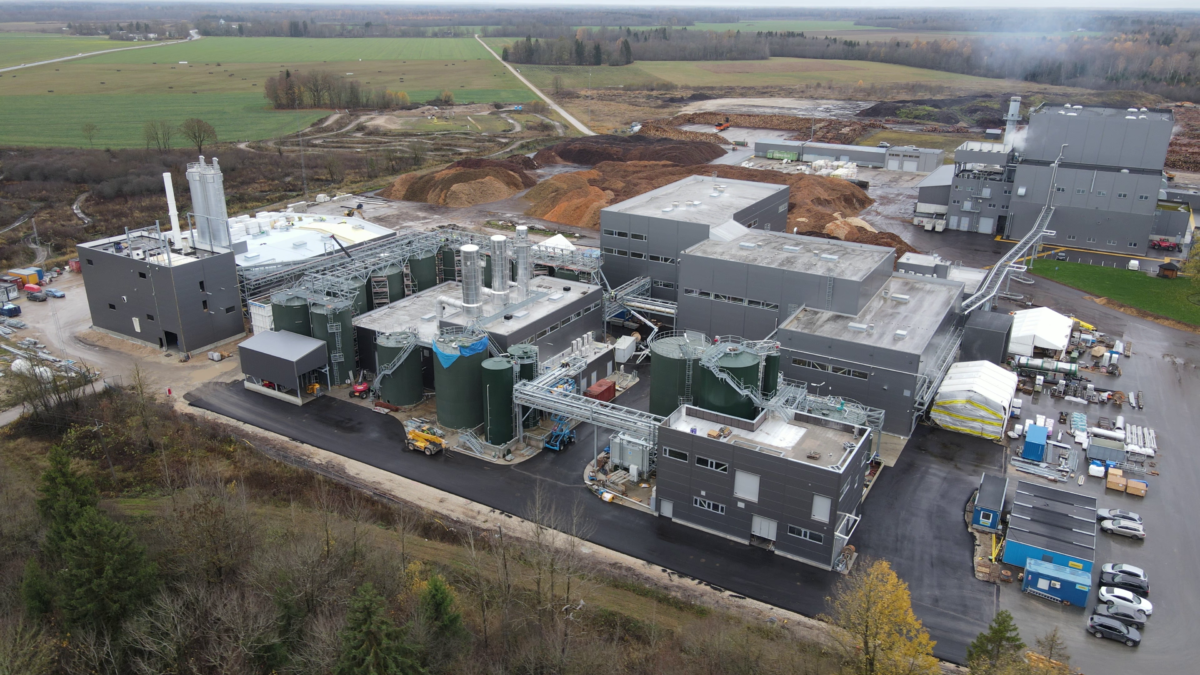
A unique technological breakthrough is turning wood residues into a wonder material. It’s a technology that embodies the circular economy and sustainability and at its heart is an efficient water treatment system from Biothane, a business unit of Veolia Water Technologies.
Fibenol is putting the finishing touches to a full-scale demonstration unit for a remarkable new technology that has the potential to transform a whole range of major industries using materials produced from wood. Instead of the current system of fossil fuel-based building blocks in sectors like chemicals, liquid fuels, and construction, the technology represents an opportunity to deploy bio-based materials using a process that exemplifies the circular sustainable economy. It’s a radical modernisation of the forestry sector, but at the heart of the system is effective process water treatment. Key to the success of the project was a close partnership between Fibenol and Biothane. Working with Fibenol, Biothane played a vital role in achieving the desired outcomes of plant design in terms of sustainability, efficiency, and productivity by allowing almost all of the process water to be treated and reused.
Led by Fibenol, the SWEETWOODS consortium project is a commercial-scale demonstration plant that is under development at Imavere in Estonia. Nine European companies have joined forces in this flagship project. By using a novel pre-treatment process in combination with enzymatic solutions, the residual hardwood feedstock can be transformed into high-value products.
Even in the demonstration phase, the so-called Sunburst pre-treatment process developed by Sweetwater Energy Inc is already meeting expectations on performance targets. Crucially though, the elegant wood fractionation design converts more than 90% of the biomass into high-value usable bioproducts within a small physical footprint and with minimal environmental impact.
Using proprietary technology, the plant efficiently converts wood processing residues into high-purity cellulosic sugars and lignin called LIGNOVA™ at an industrial scale. LIGNOVA™ materials are used for production of biocomposites for injection molding, different resins and adhesives, tested out inrigid polyurethane foam panels for insulation and many other applications. The produced cellulosic sugars are also suitable for fermentation processes to make bio-isobutene, for example. This is a key ingredient in many fossil-based products and its conversion into cosmetics ingredients has already been successfully demonstrated.
Ultimately, this resource-efficient and value-added approach marks a breakthrough for wood processing, transforming a relatively static sector into a cutting-edge biomaterial and biochemicals industry that provides sustainable alternatives to fossil fuel-based resources.
Reinventing wood products
Over the last 20 or 30 years, there has been lots of effort to innovate new techniques for the bioprocessing of woody biomass, in particular for converting wood into biobased building blocks. The primary obstacle has been to achieve that outcome at good efficiency and to do it in a way that the outputs are of high quality. The Sunburst pre-treatment process allows us to produce sugars that can be with ease used for ethanol fermentation but also other biochemical fermentation routes. The quality of the high-purity hydrolysis lignin and the unique extraction method for microcrystalline cellulose are enabling a new era of biomaterials and bioproducts, helping industries do more with less at high efficiency, with minimal environmental impact and maximum resource recycling and reuse.
With lower greenhouse gas emissions, decreased water and chemicals requirements, the Sunburst fractionation process utilises almost the entire wood mass while reducing waste by some 80% when compared with other state-of-the-art industrial biorefining processes. It also proves the ease of implementation and simple operations needed to recover this additional value from a small footprint. The Sunburst pre-treatment module requires less than 250 m2 to convert wood flakes into an easily pumpable homogenous liquified wood slurry.
Taking less than 45 minutes from start-up to reach operational conditions, its high-purity outputs are largely free of unwanted by-products, making a true biorefinery possible and offering the possibility that almost anything that is made from oil today could be made from wood in the future.
Developing the SWEETWOODS demonstration plant downstream process design concept started with the wastewater treatment and selecting a top-tier water treatment partner like Biothane. It was determined that to ensure process efficiency the plant would need to use technology that allows at least 75% of the treated water to be recycled as process water. With this as the starting point, it was possible to begin defining what kind of technologies were to be used. Furthermore, about 90% of the organic fraction within the outflow is transferred to the biogas production process which is then used within the on-site combined heat and power plant for energy production. The process is fully powered by renewable energy, which part is derived from the produced biogas.
Although it is a unique process, Biothane delivered the robust water recycling elements of the system using standard and off the shelf technologies from Veolia’s extensive water treatment tool box.
The future of fractionation
Development of the concept for SWEETWOODS wood fractionation demonstration plant began in 2016. Complete final acceptance tests of the Sunburst pre-treatment technology have already been achieved in 2021 and the demonstration plant will be fully functional in 2023. Annual production capacity will be around 8,000 tonnes of different LIGNOVA™ grades and some 20,000 dry tonnes of cellulosic wood sugars.
The next phase of the Fibenol developments will see the technology scale to full industrial capacity with production rates of 8 to 10 times that of the demonstration plant in Estonia. Given the pre-treatment technology is modular, the capacity of any subsequent plant can be easily scaled depending on the location and feedstock availability. Again, water treatment will be the defining factor in developing plant capacity but further improvements are possible here. For example, the decision to deploy a cross-flow type membrane in the demonstrator plant was a consequence of the very small footprint available at the Estonian project site. Indeed, the entire system including water treatment occupies a footprint of just 500 m2. Nonetheless, at any full-scale unit, a submerged filtration system would represent an opportunity to reduce energy consumption if more space was available. Similarly, if further improvements in water quality are needed, the existing filtration system could be extended with the deployment of off-the-shelf reverse osmosis (RO) membrane filtration system.
Traditionally, the wood industry has been focused on a specific end product while any by-products are typically used as feedstock for low-value energy solutions. With the Sunburst pre-treatment process breakthrough, a new approach is made possible by Fibenol. The raw material feedstock is still forestry and wood industry derived, but by turning materials of limited value into high-value biomaterials, the philosophy is completely different.
For the SWEETWOODS project, Biothane’s technology is delivering biogas and cleaned process water for recycling at high efficiency, a low-impact process that sits at the heart of this wood fractionation revolution. It’s a system that not only reduces fossil fuel use and minimises the impact on water resources but is the full realisation of the sustainable circular economy.
Life Cycle Assessment (LCA)
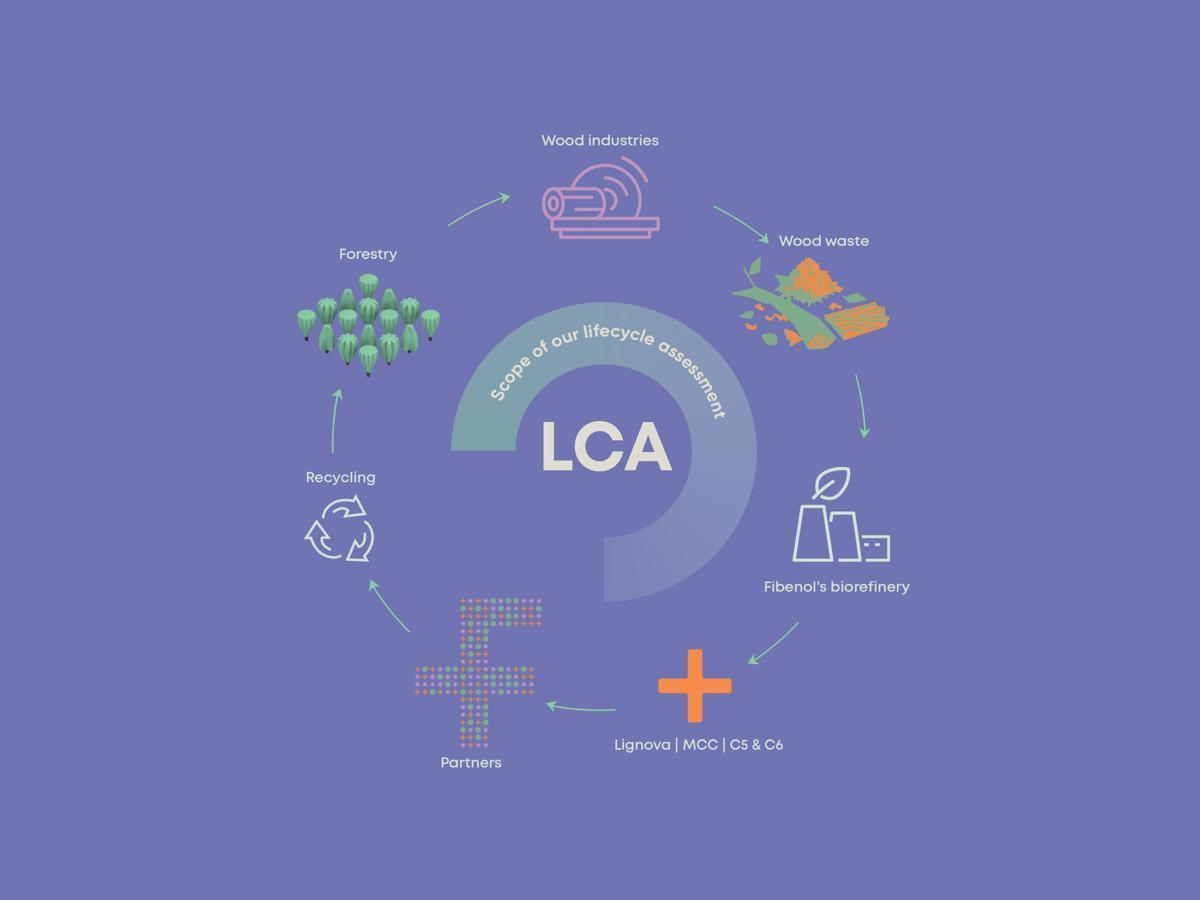
LCA is a methodology which aims to quantify and evaluate the environmental impacts associated with a product, process, or service throughout its entire life cycle. Some of the most relevant aspects under consideration include water and land use, greenhouse gas emissions and energy consumption.
Life Cycle Assessment (LCA) of our fractionation process
The scope of our LCA covers forestry, wood processing and fractionation process itself – this is called cradle-to gate approach.
Carbon neutrality
At the moment there are heated discussions on the topic of biogenic carbon accounting in LCA calculations. The bio-based products industry is fighting to include the biogenic carbon credit to the equation even though most standards and guidelines on LCAs do not support that. In general, to subtract the carbon credit in cradle- to-gate study the biogenic carbon must remain stored for more than 100 years. In our case, as the products have many different possible applications and the end-of-life phase is excluded from our LCA studies (cradle-to gate), accounting carbon credit would not be appropriate.
Results
Fibenol ©
Final acceptance tests completed in the SWEETWOODS biorefinery in Imavere
SWEETWOODS project coordinator Fibenol is announcing together with Sweetwater Energy successful completion of final acceptance tests of the Sunburst pre-treatment technology. Another step closer to the new era in wood biorefining!
Read more here: https://fibenol.com/news/fibenol-and-sweetwater-complete-final-acceptance-tests-of-the-pre-treatment-technology-in-imavere
SWEETWOODS partner Graanul Biotech new name and brand is FIBENOL
SWEETWOODS partner Graanul Biotech is changing both the company name and the brand as FIBENOL – „Rethinking the wood bioprocessing industry to deliver MORE from LESS“. To learn what we mean by that, have a look at www.fibenol.com
So far Graanul Biotech has been a part of Graanul Group –best known for sustainable bioenergy solutions, pellet production and forestry management. Although we are relying on the same foundation – sustainably managed forests – our approach to wood processing is different.
We are really glad to announce that our unique wood fractionation flagship plant project has turned out to be a success and we have reached targeted process performance milestones, which allows us to proceed towards industrialization of the concept.
We have been asked a lot about our targets and timeline. We already successfully commissioned the unique fractionation system at the end of 2020 and we are now in the middle of scaling up the downstream processing part of the plant, to be commissioned by the end of 2022. All this results in industrial supply of hardwood derived cellulosic sugars, high purity hydrolytic lignin LIGNOVA™ and unique non Kraft fibre derived micro crystalline cellulose with different purity grades. Meanwhile, we are operating our downstream processing pilot plant to produce and supply up to ton scale samples for testing. Updated product data sheets can be shared in our follow-up discussions.
Sustainability is a complex story that we aim to present in a transparent and easy to understand manner. Our sustainability concept backbone is built on decades long mechanical wood processing experience and bioenergy sector related regulative framework, meaning environmental feasibility has always been one of our core values – starting with raw material acceptance only from FSC and PEFC certified forests, minimization of resource use throughout the logistics and wood processing value chains, while improving our daily contribution in socio-environmental aspects. Our biorefinery life cycle analysis will be transparent and soon available to all partners.
We are on a really exciting journey so far and with the new identity FIBENOL we aim to set new standard for the quality and consistency of supply of sustainable bio-based raw materials to enable You bring the much-needed innovation to the market.
Graanul Biotech update webinar on the progress in Imavere
SWEETWOODS coordinator held a webinar presentation recently in the Lignocity platform (link). Lignocity is a unique collaboration between RISE Research Institute of Sweden, Paper Province, the Municipality of Kristinehamn and Karlstad University focusing on different aspects of lignin valorization.
Peep Pitk touched the topics of our flagship plant construction progress, product qualities and gave an outlook for the future.
SWEETWOODS lignin new value-chain
SWEETWOODS biorefinery lignin has entered a new value-chain through the BBI JU flagship project VIOBOND.
SWEEDWOODS leading partner Graanul Biotech is the partner supplying different lignin qualities to the VIOBOND consortium for the development of a new lignin phenol-formaldehyde resin plant. The project aims to replace fossil-derived materials with bio-based alternatives in the production of furniture, floor coverings, thermal insulation, sandpaper and other everyday products. The project combines knowledge and experience in lignin, wood processing, energy, engineering and other fields of scientific research and industrial production.
For more information read the VIOBOND press release: The VIOBOND consortium will replace fossil resources with renewable lignin in everyday consumer products
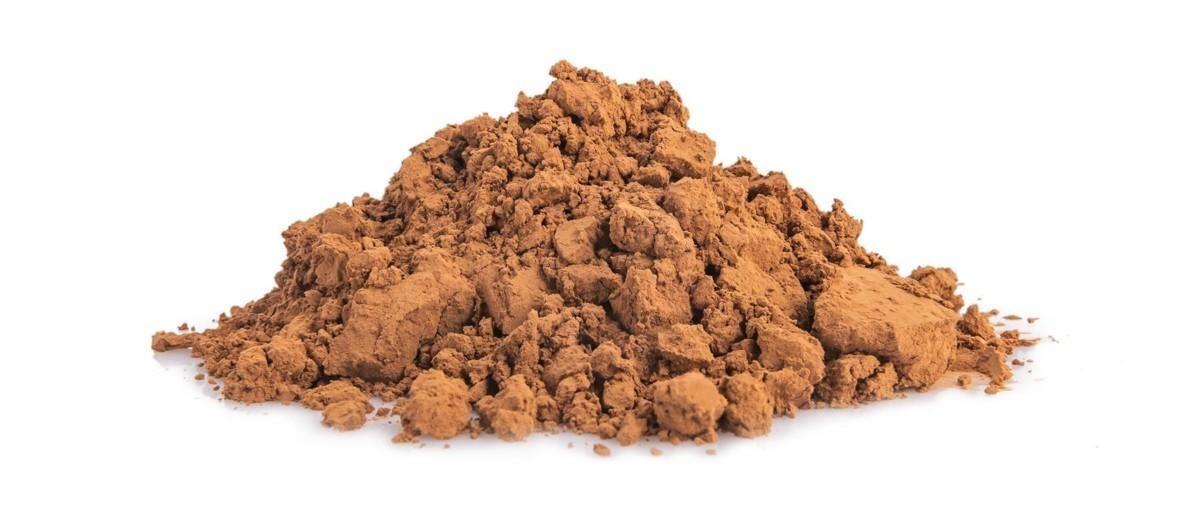
High purity lignin
SWEETWOODS project IBN production scale-up
SWEETWOODS project partners Global Bioenergies and Graanul Biotech have initiated demo scale IBN fermentation production campaigns.
The Bio-Based Industries Joint Undertaking (BBI JU) funded SWEETWOODS project partners Global Bioenergies and Graanul Biotech have been collaborating since 2018 with the common goal of establishing a first of a kind high yield isobutene (IBN) production from cellulosic sugars process. Since the start of the project continuous progress has been achieved on both cellulosic sugars production by Graanul Biotech and IBN bioprocess side by Global Bioenergies.
The SWEETWOODS novel fractionation flagship uses sustainable hardwood residues to demonstrate, on an industrial scale, how novel pre-treatment technology in combination with tailored enzymatic solutions can provide high-quality wood sugars and hydrolytic lignin. Graanul Biotech has successfully started up the wood fractionation flagship plant first phase and is now producing cellulosic sugars at the ton scale.
As the mild pre-treatment process applied in the demo plant is very fast and highly controllable Graanul Biotech is able to produce cellulosic sugars with high purity and low inhibitory profiles. The cellulosic sugars can be concentrated up to 60-70% range without viscosity and crystallization issues – this means that they can substitute dextrose up to 100% even in more demanding fermentation processes.
The high quality of the sugar translates into top fermentation performances for the production of IBN. Global Bioenergies has tested the new cellulosic sugars at lab scale and pilot scale and found that they promote biomass growth and allow for high productivity of IBN. The consortium has now initiated demo scale IBN production campaigns.
“The use of 2nd generation substrates is essential for the production of large quantities of IBN to replace fossil-based materials in a range of products from jet fuels to cosmetics. Our partnership with Graanul Biotech has shown that wood-derived sugars can be produced with the right properties at an industrially relevant scale,“ said Global Bioenergies senior project leader Nicolas Barraud.
“We have been collaborating with Global Bioenergies for quite some time now and I am very impressed by the unique fermentation process delivering such good results on our sugars. Looking forward to completing the next steps and realizing the 2nd generation sugar to IBN route on an industrial scale one day, “ commented Graanul Biotech´s product manager Karl Peebo.
The SWEETWOODS consortium, led by Graanul Biotech, brings together innovation-oriented partners: Global Bioenergies, Tecnaro, Armacell, Recticel, MetGen, 2B Srl and Spinverse. The SWEETWOODS project has received funding from the European Union’s Horizon 2020 research and innovation programme under grant agreement No. 792061.
- For more information on the quality and availability of cellulosic sugars please contact: karl.peebo@graanulinvest.com
- For more information on cellulosic IBN contact: nicolas.barraud@global-bioenergies.com
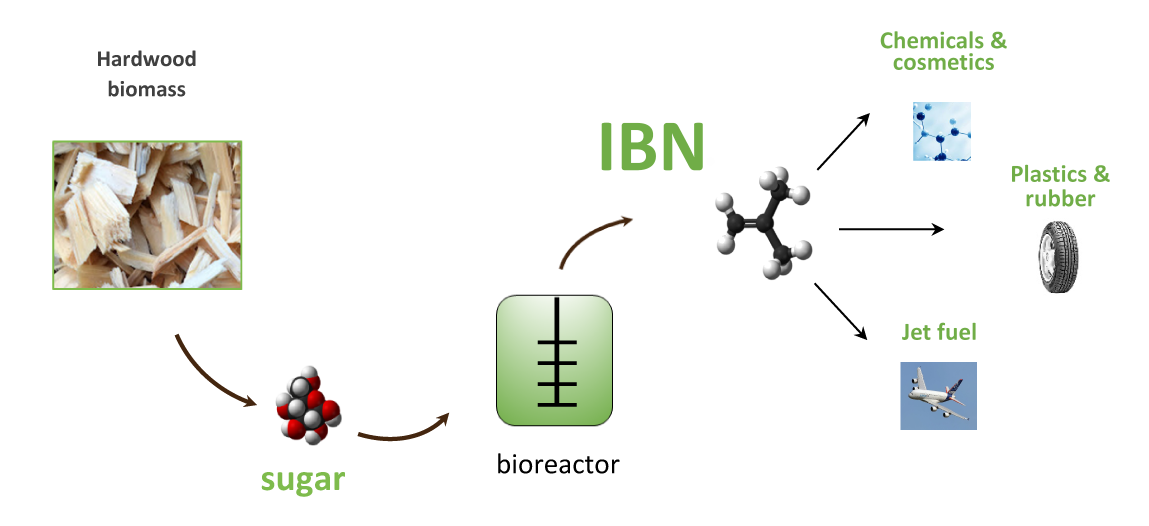
SWEETWOODS delivers first tons of high purity lignin and wood sugars
The flagship of SWEETWOODS has reached its first milestones with industrially representative samples of high purity lignin and wood sugars available at the ton scale for testing at novel value chains.
The Bio-Based Industries Joint Undertaking (BBI JU) funded SWEETWOODS wood valorisation flagship is now ready to ship out industrially representative samples of high purity near-native lignin and wood sugars at the ton scale. The project’s leading partner Graanul Biotech has stated that the first phase construction works of the flagship were finished in 2020 and that the construction of the second phase, where hydrolysis, separation processes, and lignin drying will be established, has started. Graanul Biotech estimates that an industrial supply of novel lignin and sugars will be available the last quarter of 2022.
The SWEETWOODS novel fractionation demo plant uses sustainable hardwood biomass to demonstrate, on an industrial scale, how novel pre-treatment technology in combination with innovative enzymatic solutions can provide high-quality lignin and wood sugars. This unique technology converts over 90% of hardwood into usable high-quality feedstocks for biomaterials and biochemicals and enables establishing novel bio-based value chains with a low ecological footprint.
‘The whole fractionation process still needs to be challenged within 24/7 operation at scale, but preliminary performance tests have had very promising results yielding expected high purity lignin and sugars. This means that we have created a strong basis for near term realisation of supply of sustainable feedstocks for different biomaterials and biochemicals production to create industry-changing new value chains, where wood as sustainable raw material plays a vital role.” said Graanul Biotech’s R&D Manager Dr Peep Pitk.
High purity lignin and wood sugars in evaluation
One of the goals of the SWEETWOODS project is to establish markets for lignin and sugar-based platform chemicals. The consortium partner Tecnaro, which develops and produces thermoplastic compounds, composites and blends, confirms that high-purity lignin from the SWEETWOODS project can be used as a substitute for conventional lignin in biocomposite production, offering improved product quality without odour.
‘These first tests show positive results that novel high purity lignin will allow Tecnaro to enter higher value markets and gain competitive advantage through both sustainability and performance,’ said Dr Michael Schweizer from Tecnaro. The Tecnaro product family includes ARBOFORM®, which is made from 100% renewable raw materials and is biodegradable.
SWEETWOODS consortium member Recticel is currently evaluating on lab scale which (depolymerised) lignin types are most suitable for incorporation in rigid foam for insulation boards. The most suitable candidates will be further upscaled and screened on a semi-industrial scale.
Another consortium partner Global Bioenergies has successfully scaled up the production of bio-isobutene from residual wood derived sugars at the ton scale. The company is also progressing very well towards the commercialisation of renewable cosmetics with the first EU registration of a key cosmetic-grade ingredient derived from fermentative isobutene.
An important part of the SWEETWOODS project is to evaluate the environmental and socio-economic performance of the SWEETWOODS plant, feedstock, and of the developed products. The consortium member 2B has been working on the Life Cycle Assessment (LCA) of the whole wood fractionation process to calculate the environmental impact of the outputs of this process: sugar concentrates and lignin. The LCA has allowed the identification of the environmental hotspots of the fractionation process, which are useful in an eco-design perspective. The LCA results are currently being compared with other biorefining processes and products to get a numeric estimate of the environmental benefits of the SWEETWOODS flagship technology.
The SWEETWOODS consortium, led by Graanul Biotech, brings together innovation-oriented partners: Global Bioenergies, Tecnaro, Armacell, Recticel, MetGen, 2B Srl and Spinverse.
This SWEETWOODS project has received funding from the European Union’s Horizon 2020 research and innovation programme under grant agreement No. 792061.
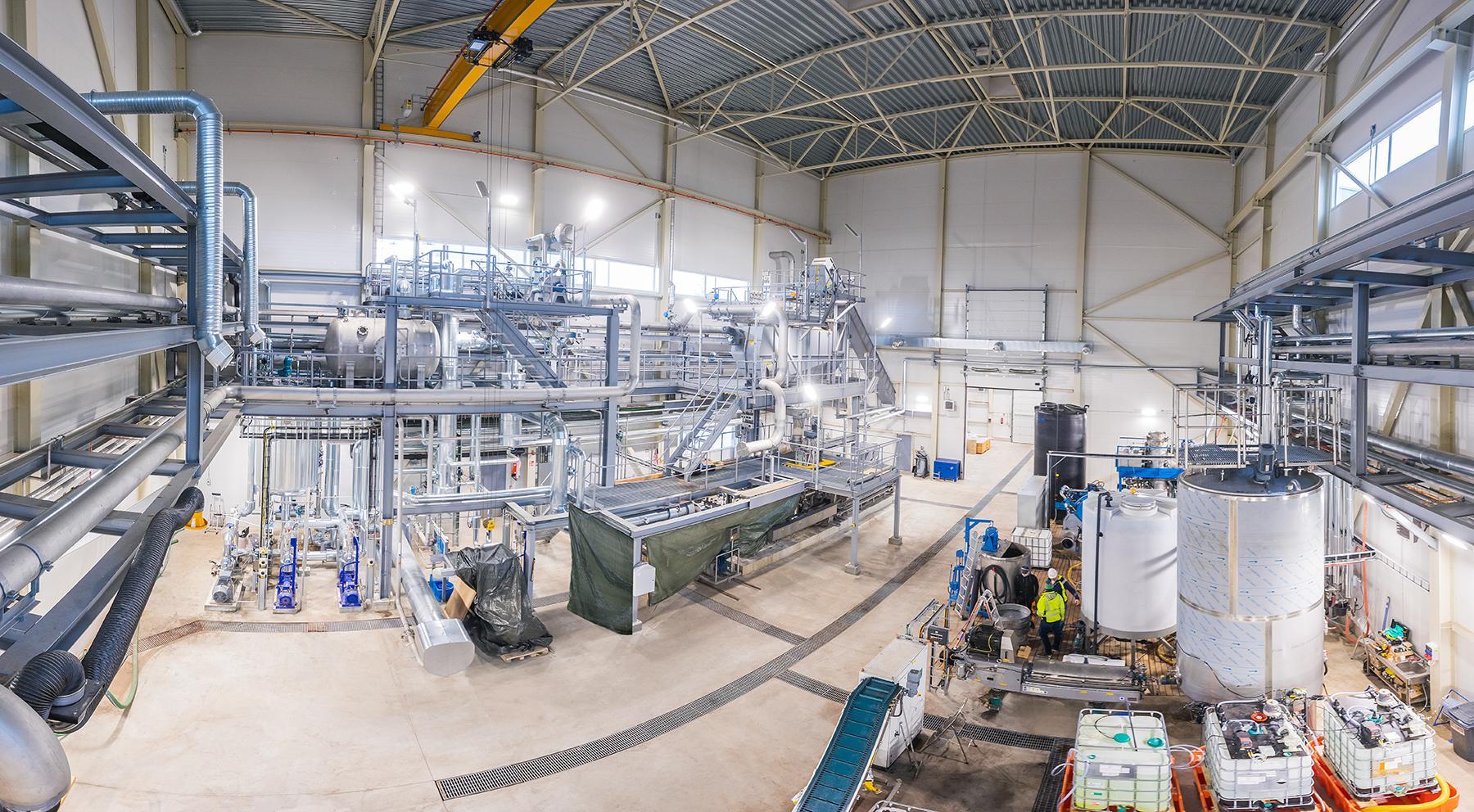
SWEETWOODS flagship
SWEETWOODS project is progressing as planned
SWEETWOODS consortium had a productive review meeting in Brussels at the beginning of March where external experts took a closer look at our progress and confirmed that SWEETWOODS project is on track.
SWEETWOODS project periodic report for the first 18 months was accepted by the BBI JU. With the first 18 months a lot of progress with novel lignin and cellulosic sugars applications has been made.
As of today, SWEETWOODS flagship plant construction works have been finished and key equipment installation is nearly completed.
Although due to COVID-19 pandemics delivery of certain equipment and instruments have been delayed, nevertheless all preparations are in place to start with commissioning as soon as pandemic related restrictions allow.
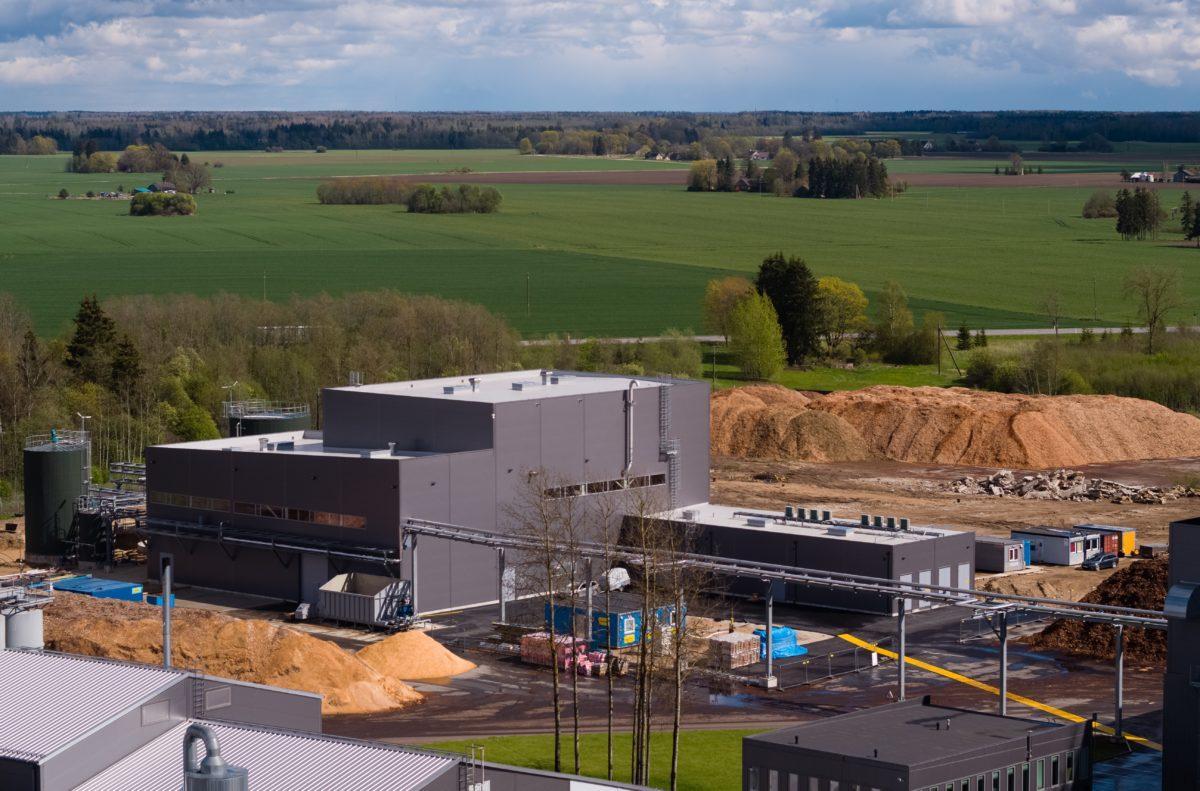
Flagship plant in Estonia, Imavere
SWEETWOODS shared insights at projects fair and Stakeholder Forum
The SWEETWOODS project shared its updates and progress at BBI JU Stakeholder Forum and projects exhibition event in Brussels on the 3rd and 4th of December 2019.
Bio-based industry community was brought together to facilitate open discussion on the impact, achievements and strategic direction of the BBI JU programme, as well as the latest developments in the bio-based industries sector.
On the 3rd of December the projects event was held with 100 BBI JU granted projects that showcased technologies, processes and products and their concrete added value in everyday lives. Bringing 100 granted projects together in one venue allowed the participants to network with the project representatives and facilitate the exchange of ideas and knowledge.
SWEETWOODS project was represented by leading partner Graanul Biotech R&D Manager Peep Pitk and consortium member Metgen CEO Alex Michine.
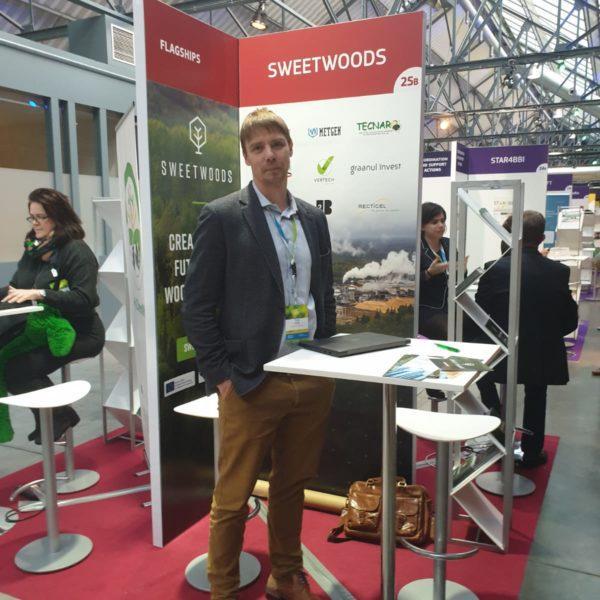
On the 4th of December BBI JU Stakeholder Forum main event took place with a comprehensive programme of high-level speakers. Among other great speakers was the SWEETWOODS leading partner Graanul Invest CEO Raul Kirjanen who talked about the need to have stable policies for bioeconomy development.
